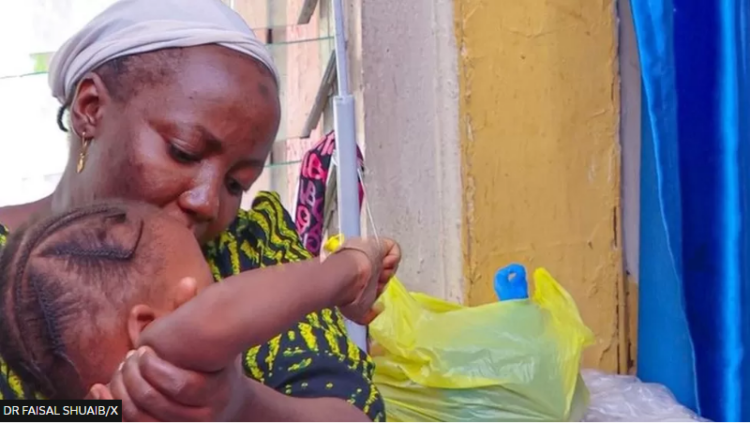More than 600 people, mostly children, have died of diphtheria in Nigeria since the current outbreak began in December 2022, officials say.
With 14,000 suspected cases, this outbreak is far worse than the last one in 2011 when 98 cases were reported.
Kano state, in northern Nigeria, is the epicentre, recording more than 500 deaths, but there has been a recent decline in active cases.
Diphtheria is highly contagious and affects the nose and throat.
It can also cause ulcers on the skin.
It is spread by coughs and sneezes or through close contact with someone who is infected, and in serious cases can be fatal.
It is preventable through vaccines, but many of the children who have died in Nigeria were unvaccinated, said Dr Faisal Shuaib, the head of the National Primary Health Care Development Agency.
During a visit to a diphtheria isolation centre in Kano city on Wednesday, he added: "Witnessing the young children suffering from this entirely preventable disease at the centre today was profoundly heart-wrenching."
The death toll has risen since 24 September, when the Nigeria Centre for Disease Control and Prevention (NCDC) reported 453 fatalities, and 11,587 suspected cases.
The World Health Organization (WHO) said the fatality and infection rate may be higher due to low testing and the failure by some patients to report their symptoms.
But Dr Shuaib said that measures, including contact tracing, have contributed to a decline in the number of cases.
The outbreak has hit 19 of Nigeria's 36 states as well as the federal capital, Abuja.
The worst-affected states are all in the north - Kano, Yobe, Katsina, Borno, Jigawa and Kaduna.
Health authorities are rallying parents with unvaccinated or partly vaccinated children to get them immunised, insisting that it is the most powerful way of controlling the outbreak.
The WHO said that only 57% of Nigerians are immunised with the pentavalent vaccine, which protects against five life-threatening diseases, including diphtheria.
Nigeria must increase vaccinations to cover at least 80% of the population to prevent future diphtheria outbreaks, it added.
The last major outbreak in the country was in 2011, when 21 people died and 98 were infected in Borno state, the WHO said.
Latest Stories
-
3 suspected gold smugglers arrested by GoldBod security taskforce remanded
42 minutes -
President Mahama committed to opening up Afram Plains once and for all – Roads Minister Kwame Agbodza
58 minutes -
Movement for Change: No law broken in Chief Justice suspension process
1 hour -
Today’s Front pages: Tuesday, April 29, 2025
1 hour -
GBA’s call on Prez Mahama to ‘suspend the suspension of the Chief Justice’ shocking – Movement for Change
1 hour -
Oliver Barker-Vormawor sues Police, Prison Service, Attorney-General for GHC 9.9 million over wrongful imprisonment of farmer
2 hours -
Defamation case: Court orders GH¢700K award to Ntim Fordjour
2 hours -
If Trump really is running the world, where will he take it?
2 hours -
Kofi Adams hails Kurt Okraku for ‘righting wrongs’ in Ghana’s football system
2 hours -
Osinachi: Why court sentenced husband to death
3 hours -
Namibian minister sacked after being accused of rape
3 hours -
Association of Automobile Artisans unveils national leadership and future plans
3 hours -
Stop blaming others and admit your failures – Asah-Asante tells Bawumia
3 hours -
Galamsey battle undermined by politicians’ involvement – Tony Aubynn
3 hours -
Bono Minister orders NEDCo to tackle intermittent power outages
3 hours

